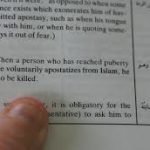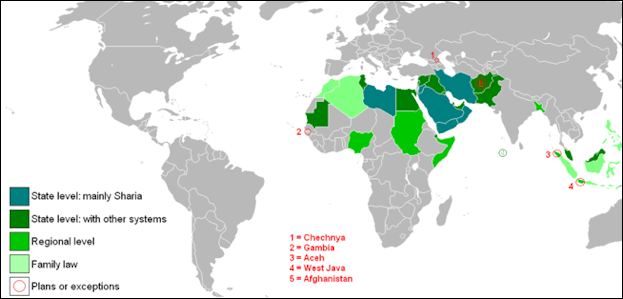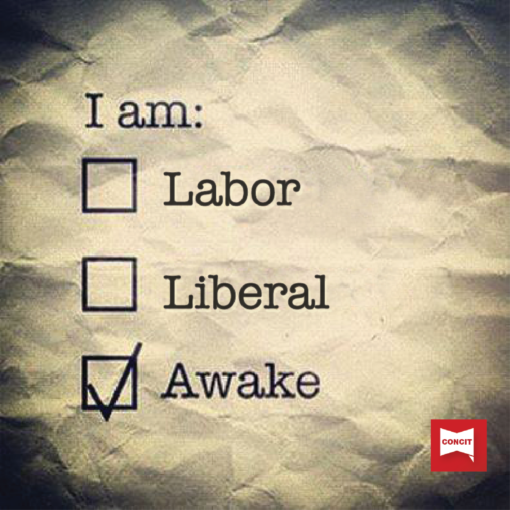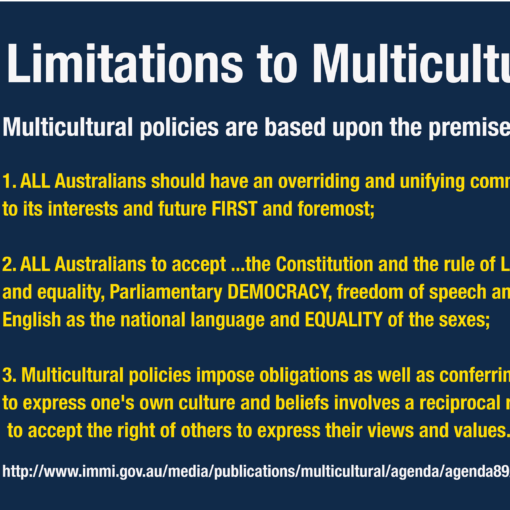Islamic Law, or Sharia (also Shari’a or Shariah ) literally means “well-worn camel path to the watering place.” and has been termed the “Sacred Path” of Islam. It provides Muslims with religious and political guidelines for their journey on earth. It is derived from commands in the Koran (19%) and the example of Muhammad (85%).
 Shariah law tells followers how to perform their prayers, how to pay their alms, how to observe the fast. It also describes how Muslims should dress, what food Muslims can eat and even what greetings can be exchanged.
Shariah law tells followers how to perform their prayers, how to pay their alms, how to observe the fast. It also describes how Muslims should dress, what food Muslims can eat and even what greetings can be exchanged.
Sharia is expected to be abided by as a system of laws and rules for living. It also sets forth an ethical ideal of which one is supposed to conform to individually and within a community.
Sharia are classifications of acts: standards of conducts and moral evaluations of this actions (such obligatory, recommended or forbidden).
An underlying assumption of Sharia is that only God can distinguish between good and evil and man’s reasoning is subject to errors and thus should be eliminated whenever possible.
THE “RELIANCE OF TRAVELLER”
The most complete concise sourcebook for Sharia Law is ‘Umdat al-Salik, or Reliance of the Traveller, compiled by Ahmad ibn Niqib al-Misri (d. 1368).
This “classic manual of Islamic Sacred Law” was translated into English by Nuh Ha Mim Keller in 1991. The 1,200 page volume has been certified by Al-Azhar University (Egypt) and the International Institute of Islamic Thought (USA).
Many of the provisions have been brought more up-to-date with commentary by ‘Umar Barakat (d. 1890). While the volume represents the Shafi’i School of jurisprudence, it is identical with 75 percent of the other three Sunni Schools of Islamic law. References in the text are to this manual or the Quran.
The Reliance of the Traveller, or Umdat al-Salik, was composed in the 14th Century by Shihabuddin Abu al-‘Abbas Ahmad ibn an-Naqib al-Misri (1302–1367). It is a classical manual of Shafi’i fiqh, meaning it is an authoritative summation of the Islamic jurisprudence– also known as Shari’a– associated with the Sunni Shafi’i school. al Misri based the Umdat al-Salik on the previous Shafi’i works of Nawawi and Abu Ishaq as-Shirazi.
Even given its age, it is by no means an irrelevant or outdated document, for Muslim followers of Shari’a, once a consensus of scholars rules on a matter, it is no longer subject for debate.
This text is the first Islamic legal work in a European language to receive certification from the most important seat of Sunni Islamic jurisprudence, Cairo’s al-Azhar University. It has also been endorsed by the Muslim Brotherhood who supply the leadership for al-qaeda and many of the other jihadist groups.

The Umdat al-Salik is broken into sections dealing with every area of life Shari’a is concerned with– from epistemological questions on “sacred knowledge” to practical legal rulings on marriage, divorce, trade, inheritance, fasting, zakat, etc.
To illustrate how the legal concepts of the Islamic “Lawgiver” differ significantly from those based on reason, here are some familiar commands from Mosaic Law that have underpinned Western society:
- Love your Neighbor (or “the Golden Rule”): “Those who follow [Muhammad] are ruthless to the unbelievers but merciful to one another. (Quran 48:29) Islam always distinguishes between Muslims and non-Muslims.
- Do not Murder: Sharia exceptions: Murdering an apostate (deserter of Islam) (Para. o4.17) and a parent murdering his/her children or his/her children’s children (Para. o1.2(4)) The latter exception applies to honor murders.
- Do not commit Adultery: Sharia exceptions: Sex with multiple wives (m6.10), sex with slaves and captives (Quran 33:50), and sex with temporary wives (Quran 4:24).
- Do not steal: Sharia exceptions: Forcible seizure, snatching and running, and theft by betraying a trust (embezzlement). (Para. o14.6) Corruption is rampant in Islamic states due to these exceptions.
- Do not bear false witness: Sharia exceptions: It is OK to break the intent of the oath, as long as you don’t break the letter of the oath. (Para. o19.1) and “When it is possible to achieve such an aim by lying but not by telling the truth, it is permissible to lie if attaining the goal is permissible.” Examples including protecting Islam or a Muslim. (Para. r8.2)
The most serious Sharia Law capital crime is “blasphemy “- insulting Islam or Muhammad. A Muslim is considered an apostate – subject to being killed by anyone – for being sarcastic about the Quran, any part of Islam, any ruling of Sharia Law, or any of Allah’s messengers. (Para. o8.7)
Therefore what Allah has decreed through the scriptures and how Muhammad lived his life has ultimate say for Muslims. Female inequality, wife beating, the cause of Islam to become the supreme religion of the world, Jihad, zakat payments are all part of the decrees of Allah found in the Koran and so are also found in the Sharia Law Manual.
It is a set of legal codes based on scriptures from the Koran and interpretations of these scriptures by classical Islamic schools of thought. Governing public, private, social, religious and political life of Muslims, the laws are based on the principal that Koranic commands are divine and absolute and can not be questioned. To break one of the rules or even doubt their legitimacy is a sin.
Even given its age, the Umdat al-Salik is by no means an irrelevant or outdated document. Certificates of authenticity attest to the translation from the governments of Egypt, Syria, and Saudi Arabia– and the text is the first Islamic legal work in a European language to receive certification from the most important seat of Sunni Islamic jurisprudence, Cairo’s al-Azhar University.
In addition, the opening pages of the Umdat al-Salik contains a similar endorsement from the Muslim Brotherhood-linked International Institute of Islamic Thought (IIIT) in the United States (also from KBS):
“There is no doubt that this translation is a valuable and important work, whether as a textbook for teaching Islamic jurisprudence to English speakers, or as a legal reference for use by scholars, educated laymen, and students in this language.” Dr. Taha Jabir al-‘Alwani, International Institute of Islamic Thought”— (Herndon, VA; December 1990)
Q Society have a copy of Sharia Law for non Muslims that is worth reading that uses their texts but puts it sections of relevance for non muslims: follow this link.
There are complete PDF’s of Reliance on the Internet but they are in the process of being removed as they were from our page. Chapters of interest to check out are “M” “O” and “R”.
COPYRIGHT DISCLAIMER
Including original material, these videos and articles may contain copyrighted material the use of which has not been authorised by the copyright owner. Such material is made available to advance the understanding of ecological, political, human rights, economic, scientific, moral, ethical, social justice issues and in the interest of public good.
In accordance with title 17 U.S.C section 107, these materials are distributed to those who have expressed prior general interest in receiving such formation for research and educational purposes.
Under section 107, under the copyright act 1976, an allowance is made for “FAIR USE” fair use for for purposes such as criticism, comment, news reporting, teaching, scholarship and paid research.
Fair Use is a use permitted by the copyright statute that may otherwise be infringing.
Education or personal use tips the balance in favor of “Fair Use”. Use of such copyrighted material does not imply endorsement of the content contained in these films by the original owners of the material
Fair Use is a use permitted by the copyright statute that may otherwise be infringing.
Education or personal use tips the balance in favor of “Fair Use”. Use of such copyrighted material does not imply endorsement of the content contained in these films by the original owners of the material.
Top recommendations
- Casino Utan Spelpaus
- Casino Non Aams
- Crypto Casino
- Casino Sites Not On Gamstop
- Migliori Casino Online Non Aams
- UK Casino Not On Gamstop
- Gambling Sites Not On Gamstop
- Slots Not On Gamstop
- Non Gamstop Casino Sites UK
- Sites Not On Gamstop
- Online Casinos
- Not On Gamstop Casinos
- Non Gamstop Casinos UK
- オンラインカジノランキング
- Gambling Sites Not On Gamstop
- Casino Online Non Aams
- UK Online Casinos Not On Gamstop
- Melhores Cassinos Online 2025
- Non Gamstop Casinos UK
- Gambling Sites Not On Gamstop
- Online Casino
- Casino Not On Gamstop
- Non Gamstop Casino Sites UK
- Best Non Gamstop Casino
- Crypto Casino
- Casino En Ligne
- Tous Les Sites De Paris Sportifs Belgique
- Tous Les Sites De Paris Sportifs Belgique
- Meilleur Site Casino En Ligne Belgique
- Casino Online Non Aams
- Casino En Ligne Fiable
- Casino En Ligne France
- Nouveau Casino En Ligne France
- Migliori Casino Senza Verifica
- Meilleur Casino En Ligne France
- Casino Fiable En Ligne
- Site De Casino En Ligne
- 토토사이트
- Migliori Casino Online Italia




33 thoughts on “Reliance of the Traveller—a Sharia Law Manual”
Link to Full 1251 Page “Reliance Of The Traveller” that was good on the evening of October 23, 2017 is here:
http://www.mijnkerk.com/files/Reliance_of_the_Traveller.pdf
At this link is the first Searchable copy of the complete 1251 Page copy of the printed Reliance of The Traveller published by Amana Publication, Beltsville, Maryland I have downloaded. I’ve had to make the other copies I downloaded searchable using my pdf software.
There is a much shorter version (in number of pages) version that is searchable when downloaded with the complete text of Reliance.
However, this version does not have the very interesting (I think) and informative Introduction which, among other things, discusses and compares the Four School of Sunni Jurisprudence (Reliance is Shafi’i School). And it does have not Three Certifications in English and Arabic approving the Translation and Work, including the approval of the General Director Of Writing, Research and Translation of the famous Al Azhar University, Cairo, the world’s premier Islamic Research Academy.
plz email link.
Would love a PDF of this. Vendors will not let me purchase a hard copy.
May I request a PDF of The Reliance of the Traveller? I would greatly appreciate it. Thank you for your consideration.
I tried to buy this online but the seller cancelled my order, presumably once they noticed my name was not Muslim. I ordered it from someone else but it never arrived and they refunded my money. Amazingly difficult to get a copy of this book.
Sir
I would appreciate if you could provide a link to download the pdf Reliance of the traveller.
Regards
Tony.
Can I get an emailed copy?
Can you send me a pdf copy of this book pls.
Much appreciated 🙂
Thanks!
Would love a copy pdf. SHARMA Hadrian refers to this in his DVDS.
I’ve been able to find most books, except the reliance of the traveller, help? Thanks
https://archive.org/details/@zeljko991
Hello,
Do you still have a pdf of The Reliance of the Traveller?
Thanks
Can I request a pdf copy of reliance of the traveller.
Thanks.
Can you send me a pdf copy of this book pls.
Much appreciated.
Dear Admin,
I have searched hi+lo on the net for this PDF. Dr. Spencer has a short version audio on this, but I ‘d like the PDF, if possible.
I’ve been able to find most books, except the reliance of the traveller, help? Thanks
Hello,
Do you have any pdf to share with me? I really need Reliance of the Traveller.
Thank you!
Hi there, do you have any pdf copies that you can share?
Hi, would I be able to get a copy of Reliance of the Traveller as well ?
can i get a copy of Reliance of the Traveller, please?
Hey Wayne! I see you wrote this a few years ago but I’m Interested in better informing myself on the subjet of Islam and shariah. Is the reliance of traveler a good source that is well known and accepted by most Muslims? Basically if I am confronted by a Muslim apologist on my knowledge I want to know I have a source mostly accepted by the Islam community.
Could you please share the PDF copy of Umdat al-Salik.
Could you send me the copy, I have searched and cannot for the life of me find it.
Hello. Can you share with me a .pdf of the Reliance of the Traveller? Or a place to download a copy? thanks,
If it’s not too late, I would like a copy please. Thanks in advance.
Just found out about this text. If I could get a copy, I would be very grateful.
Dear Concit Admin;
The Reliance of the Traveller, or Umdat al-Salik link is broken, could you please send me by email or any new link?
I am an ex-Muslim
With Regards
Anuar
Do you have the Pdf copies of the Original-the-reliance-of-the-traveller book?
check you email
and please read our Copy Right Disclaimer.
check your email
Hi there, do you have any pdf copies that you can share? I am sure the reliance of the traveller is so damning for Islam that they are now trying to hide it. Anyway, if you can email me a copy I will be very grateful.
My name and email are my “pen names” as I have received death threats in the past so I keep my information private unless I get to know someone well enough to feel safe.
God bless, John.
The Reliance of the Traveller, or Umdat al-Salik link is broken
How did you miss this? pls contact me. There’s more
In a nutshell they changed Shariah law sneakily.
I will cite example first
In Pakistan, Muslims tolerate Christians so long as they don’t break Shariah law. Sure they wait like vipers for damaged Korans or people drink from a Muslim well. But there was a kind of protection. That’s changed. Now in Shariah Law they can kill Christians and Jews just for being another religion. We have been “IRREVERSIBLY” relegated to Kafir. & it’s “OBLIGATORY”for Muslims to Kill, rape, enslave us all.
Recently 56 Islamic countries & Palestine got together and decided 100% to change Shariah law to Abrogate Christianity & Judaism as religions. This gives Muslims legal permission to Rape, kill enslave Christians & Jews as they have relegated us all to infidels, There gods enemy. Shh it’s secret..
Proof: You can find it in the manual for Islamic law (shariah) called the ‘Reliance of the traveler”. The point of reference for Clerics & travelling Muslims on Shariah law.
Reliance of the traveler
Says:
Previously revealed religions were valid in their own eras, but were abrogated by the universal message of Islam.
It goes on to say the book is written in English so that there can be no mistranslation of the message and that..
it is unbelief (Kufr) to hold remnant cults now bearing the names of formerly valid religions, such as “Christianity” or Judaism,” are acceptable to Allah Most High after he sent the final Messenger (Sic)
It ends with..
This is a matter over which there is no disagreement among Islamic Scholars (sic)
This is a scholarly consensus known as ijma that says..
the ruling agreed upon is an authoritative part of Sacred Law that is obligatory to obey and not lawful to disobey (sic)
Blah blah blah Can’t be changed..
because the ruling on it, verified by scholarly consensus, is an absolute legal ruling which does not’ admit of being contravened or annulled. (sic)
It also goes on to say that any muslims who discuss or consider (think) about the subject are to be apostatized and heads removed. This means they can’t speak about it but also it handicaps them as they can’t lie either as lying takes consideration. So if you seek other proof ask Muslims online and watch their behaviour.
*Any Muslim that is against Sharia (if not lying ) is one of the minority good guys, but that is not to say that they are unaware.
May I add that because of this change whenever you hear Muslims talking about protecting religious rights they are most likely referring to Shariah laws interpretation that only Islam is a religion.
Condemning terrorists is now easy as terrorists are people who kill Muslims a terrorist cannot be someone who kills a Kafir (Christian et al) have you noticed how the media and leaders avoid this term?
I desire feedback pls as I have to make this easier to understand.
We need to inform everyone and the Shariah guidebook must be banned worldwide